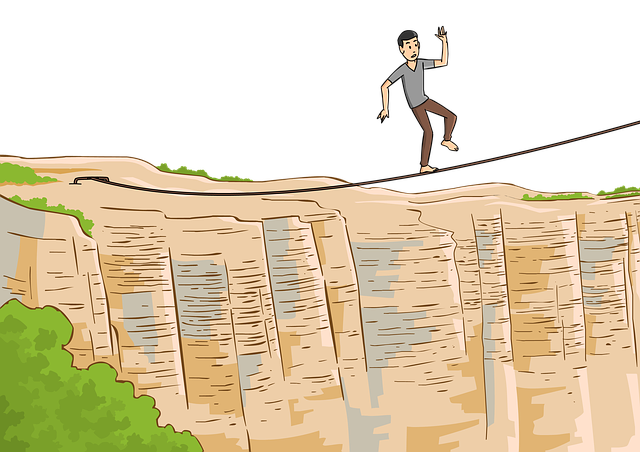 Guest post by Robin Helget, a Licensed Masters Social Worker (LMSW) in the states of Kansas and Missouri, who knows a little something about work-life balance.
Guest post by Robin Helget, a Licensed Masters Social Worker (LMSW) in the states of Kansas and Missouri, who knows a little something about work-life balance.
Robin specializes in working alongside young professionals who are looking to find their purpose; work through relational conflicts, anxiety or depression; or develop a sense of self. In a world filled with pre-determined templates to happiness and success, Robin can help you create your own formula of fulfillment and find work-life balance.
You know that feeling you get when your heart drops to your stomach? When you’ve forgotten to pick your kids up from soccer practice or forgot to thaw the chicken out for dinner that night? The feeling you get when your wife tells you your anniversary was yesterday, and you realize you forgot… again?
Life happens so quickly, all at once. We have so much on our plates that instead of taking things off when it starts overflowing, we try to shift things around or sometimes even pile more things on, creating and maintaining an overwhelming state, anxiety, and at times, chronic stress.
It seems as if the older we get or the more we take on, the more labels that attach to us. We become so many people: mom, dad, brother, employee, coworker, uncle, aunt, son, daughter, volunteer, soccer mom, PTA notes-keeper, etc. We can sometimes fall into the habit of saying “yes” to so many things that our head starts spinning and we lose our footing, feeling as if we are teetering on the edge of a tightrope, looking down, wondering when we are going to fall off.

When we finally do fall off, we beat ourselves up because it must have been something we did or did wrong. We become our own worst critics which then begins to show in every area of our lives: we become irritable with our spouses, we snap at our kids, we overeat, under-sleep, and live in a headspace of misery.
Work-Life Balance
If you talked to anyone about these stressors, you may have been told that it’s all about balancing work and life–about keeping the two separate from one another so that you can be fully present. However, since when is work not a part of life?
The idea of balancing work and life brings some problems:
-
Work is a part of life.
Careers, physical health, mental health, family, friendships, relationships, leisure, vacations, paying bills. These are all parts of life. We don’t task ourselves with keeping our physical health and life balanced, do we? The idea that you can keep work and life is idealized, and when we struggle with bringing work home or working too little or too much, we don’t know what to do because we are supposed to know how to balance it.
Many of us value our careers and work so much that it becomes a primary activator in our lives. It can be what motivates us to become better people, fuels us to grow, and stresses us out the max when things aren’t going so great or becoming unmanageable. The idea that we can keep the two completely separate –that we can stop our brains from thinking about work or worrying about work or even being happy about work in “real life” is unrealistic.
-
Work is often a necessary part of life.
Making money is necessary for survival. In order to survive and get our basic needs met, such as shelter, food, water, and safety, money is often the driving factor. If we didn’t have careers or a job to go to each day, this safety may not be there. If our basic safety is not met, we cannot meet the other needs: self-actualization, love and belonging, and psychological needs.
Our culture still struggles with talking about money in healthy ways. We think we are greedy if we want more of it. We struggle with acknowledging that we like it. We believe there is never enough. If we changed our beliefs about money, about work, about our career–that it is not separate acts from our lives but a daily task or opportunity for self-development and meeting safety needs, then we will give ourselves the chance to look at it differently.
-
Work is not all your life.
Enjoying going to work is not a negative thing. As mentioned above, work is necessary. Whether your work is in a corporate office, running around as an entrepreneur or staying at home with kids, your work matters. Our work often teaches us the most about ourselves–it helps guide us in decision-making and gives us a certain level of fulfillment or lack of fulfillment that motivates us to do something differently.
It’s important to remember, though, that work is a part of your life, but it isn’t all of your life. No matter if you’re single, married, or in a “it’s complicated” relationship, life outside of work is equally as important. Because you’re single and may not have a family to go to yet, you may be asked to work extra. Say “No!” Just because you can, doesn’t mean you have to. Having hobbies outside of your career, having activities you enjoy doing with friends or family, working on projects that make you excited, outside of the regular work day is imperative to living a fulfilling and healthy life. Because one day, work isn’t going to be there. You’re going to retire, or maybe work will get taken from you, and you have to be able to rely on the other pieces of your life to carry some of that weight at that time.
-
When we are not working, we still have to be able to balance life.
Like mentioned above, there may be a time when we are not working, and that’s completely ok. Think of your life as a pie. Work-life balance would say you need to have 50% of the pie for work and 50% of the pie for life. However, there are significant red flags that present when we do this because there are only two pieces. As humans, our lives and brains are complex. We need more than two pieces in our pie. We need more like 6-8 pieces, all distributed evenly.
Work-Life Integration
So, if work-life balance isn’t realistic, what is? When working with my clients who are young adults struggling with getting a handle on everything that life is throwing them, who is often anxious or depressed, who is so stressed they can’t function or aren’t fulfilled, I suggest the concept I’ve developed called Work-Life Integration. It’s not about being able to balance, it’s about being able to effectively integrate all the pieces of your life to where all pieces are functioning. We are integrating all pieces of life and all pieces of work together. These pieces include the following:
- Career
- Relationships
- Spirituality
- Physical Wellbeing
- Emotional and Mental Health
- Leisure
- Growth
These pieces are not definitive but are a good starting point to see what pieces are a part of your life. They mean different things to different people, but each one of them is no more important than the next. Your career holds as much weight as your relationships. Having goals and dreams and ways you are learning (growth) is just as important as the relationships in your life. Your spirituality (higher being, nature, God, Buddha, whomever) is as important as your physical well-being (Exercise, eating healthy, movement, supplements).
When the ebb and flow of these different pieces (of giving more into others at times and taking away from another piece) is not rhythmic and is chaotic, it can leave you feeling depleted, unfulfilled, unmotivated, anxious, depressed, and so on. There’s nothing wrong with you! It often takes a small shift in thinking, some behavioral changes, and learning techniques to integrate all pieces in a healthy way–so that one is not overpowering or taking from the others.
If this is something that you currently struggle with, seeing a counselor or coach can help you identify the tools, techniques, and mindset to be able to live in rhythm and integration.
Robin Helget, LMSW, CPT
Millennial Counselor & Coach
Resolve Counseling & Wellness
785-408-7529